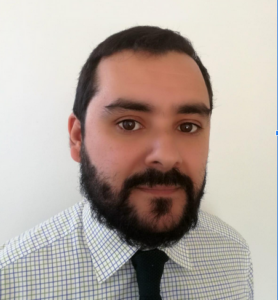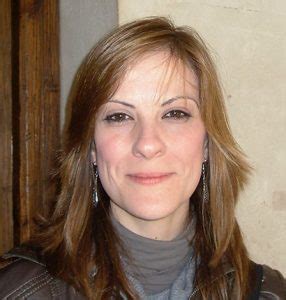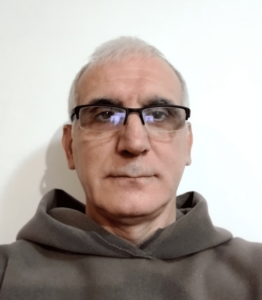Our Faculty in 2025/6
In Alphabetical Order by surname
+ + +
 Dr. Emiliano Javier Cuccia, Ph. D. Philosophy
Dr. Emiliano Javier Cuccia, Ph. D. Philosophy
Doctor Emiliano Javier Cuccia earned his Doctorate in Philosophy Summa cum Laude at Universidad Nacional de Cuyo, Argentina (2015) with the thesis “El sentido de la abstracción en Tomás de Aquino. Una reconsideración a partir del uso textual del término” His book based on the main concepts of the thesis was published in 2021 (La abstracción científica en Tomás de Aquino, ed. Peter Lang, New York, 2021).
He received his B.A. in Philosophy in the same institution with the presentation of the work “La doctrina de las virtudes morales en el pensamiento de Juan Duns Escoto. Traducción y notas de sus comentarios a la distinción 33 del Tercer Libro de las Sentencias de Pedro Lombardo”.
Doctor Emiliano Javier Cuccia has worked as an Assistant Professor at Universidad Nacional de Cuyo from 2012 to 2022, imparting lessons on the History of Medieval Philosophy, and was a doctoral and postdoctoral fellow of the National Council for Scientific and Technical Research, Conicet, Argentina, from 2011 to 2019. In 2012, he was both a Visiting Scholar at the University of Notre Dame in 2012 and a Fulbright Scholar.
Dr. Cuccia’s research focuses on the study of metaphysical and ethical issues of the Scholasticism of the thirteenth and fourteenth centuries, with particular attention to the works of Thomas Aquinas and John Duns Scotus. His latest publications are: “Algunas consideraciones sobre la abstracción como fundamento de la división de las ciencias especulativas en el comentario tomasino al De Trinitate de Boecio: ¿ontologismo vs epistemología?” Convivium 37(1):23-54, DOI: 10.1344/conv48638 and “La abstracción científica en Tomás de Aquino: un contrapunto entre la epistemología tomista y los textos” Scripta Mediaevalia 17(2):27-59, DOI: 10.48162/rev.35.040.
Dr. Cuccia was born in Argentina and currently is an Assistant Professor at Universidad Adolfo Ibáñez in Chile.
 Dr. Pilar Herráiz Oliva, Ph. D. Philosophy
Dr. Pilar Herráiz Oliva, Ph. D. Philosophy
Dr. Pilar Herráiz Oliva earned her European Doctorate in Philosophy from the University of Murcia (Spain) in 2016, under the supervision of Prof. Alfonso García Marqués, with the thesis: “Averroes en la Revolución Intelectual del Siglo XIII. Bases para una Reinterpretación de la Modernidad”. As part of her Doctoral studies, she spent four months at the Università Pontificia Salesiana (Rome), under the supervision of Prof. Mauro Mantovani. She received her M.A. in philosophy, in 2008, from the University of Murcia, with the thesis: “Dos tratados averroístas sobre la eternidad del mundo: Siger de Brabante y Boecio de Dacia”, which includes a translation with a critical introduction and notes to these two treatises concerning the eternity of the world, dating from the 13th century. In 2007, Dr. Herráiz Oliva obtained her B. A. in Philosophy, from from the same institution, with a specialization in the History of Philosophy and Science.
Her most recent publications include “La filosofía en el marco de las Humanidades Digitales. El caso de la filosofía medieval en Hispanoamérica”, in California State University’s journal, Studia Iberica et Americana. Journal of Iberian and Latin American Literary and Cultural Studies and “Aristóteles en París: averroísmo y condenas a la nueva filosofía”, in De Natura. La naturaleza en la Edad Media, vol. II, pp. 511-518. Textos e estudos de Filosofia Medieval, 8, Húmus, Ribeirão, 2015. She has also presented several papers, from which the most recent one is “Is the Knowledge of God Attainable from Philosophy? Averroes’ Proposal” at the Pontifical University of Salamanca (Spain) during its annual meeting in 2015.
She is a member of the Sociedad Española de Estudios Medievales (SEEM) and a collaborative member of the research group Nóesis at the University of Murcia (Spain), which has, as a main focus, the reception of Aristotle throughout history.
+ + + + + + + + + + + +
 Our Co-Founder: Br. Alexis Bugnolo
Our Co-Founder: Br. Alexis Bugnolo
earned his B. A. in Cultural Anthropology, with an emphasis in Classical Studies from the University of Florida, Gainesville, in 1986. Graduated Phi Beta Kappa. He graduated from Our Lady of Grace Seminary, Boston, in 1988, cum laude. He published his English translation of the Opera Omnia S. Bonaventurae, from the Quaracchi edition of 1882, in 2014, with the English title, The Commentaries on the First Book of Sentences by Saint Bonaventure of Bagnoregio, pp. 996, The Franciscan Archive.
He is the translator of the critical edition of Saint Francis’s Opuscula, under the title, A Testament of Peace: the Writings of Saint Francis of Assisi, and of Saint Bonaventure, Journey of the Mind into God — both available from The Franciscan Archive — as well as having written other opuscula of his own in the Scientific Method for interpreting Sacred Scripture and a defense of the Historicity of the Narrative in the Book of Tobias. Both of which are in print from The Franciscan Archive.
He has written a Scholastic position paper on Saint Bonaventure’s Solution to the Debate on the Ratio Formalis of the Human Person, and A Résumé of Bernardus de Rubeis’ 13th Critical Dissertation On St. Thomas Aquinas, and has published a scholarly paper in De Medio Aevo, on the Beatific Vistion of Christ in Saint Bonaventure, handed down in his Commentaria in Quatuor Libros Sententiarum. All of which can be found at Academia.edu.
In 2019, Br. Bugnolo published is Quaestio Disputata on the Renunciation of Pope Benedict XVI, which remains an authoritative compilation of the arguments pro and contra regarding this Canonical Debate, along with a discursus on the State of the Question.
Br. Bugnolo is one of the co-founders of The Scholasticum, and currently resides at Rome, Italy. In the Fall of 2020 he led the Studium on the The First Book of Sentences ad Mentem S. Bonaventurae.
